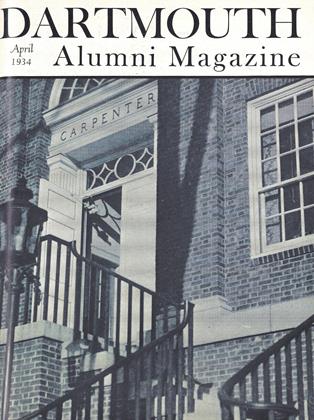The attitude of the average undergraduate toward the average alumnus is sufficiently categorical to be tangible and at the same time sufficiently vague to all but escape definition.
It is categorical because the alumnus is not regarded as an individual, but as a part of an inclusive body, the alumni, and because the undergraduate attitude is highly uniform, as is so often the case. It makes very little difference whether a man has been out of college two years or thirty. He is a graduate, equally included when the student has occasion to refer to that vague and powerful force—"the alumni."
The undergraduate's attitude is vague because he comes into contact with the alumni at infrequent intervals and under completely different circumstances. The first meeting is, of course, very probably that connected with the selective system of admission. Months later the same alumni will appear in an entirely different light at a football game or a Commencement reunion. A third atmosphere will prevail at a possible Dartmouth dinner during spring vacation. And for the rest, the undergraduate comes off and on to associate the graduate body with such diverse objects as football coaches and monetary donations, and he is conscious of the alumni as a great driving force with which the welfare of the College is inextricably bound.
There are probably few colleges, if any, which maintain a closer tie between alumnus and undergraduate than does Dartmouth. Yet it seems as though that tie might be appreciably strengthened, with one medium more frequent and widespread Dartmouth dinners during Christmas and Easter vacations.
I realize these dinners have become an established tradition, yet I do not think their full potentiality has been any where near realized either intensively or extensively. For example, there have been a few such dinners in my home town (population from that city have ever attended one. We simply did not know of their existence until the next day when we read about it in a newspaper, or until we had returned to Hanover and heard about it second or third hand.
No community is too small for these periodic gettogethers, and an effort should be made to have present every Dartmouth graduate and every Dartmouth student in the vicinity. The initiative is probably best left to the alumni. And they can rest assured of hearty cooperation, for all in all the undergraduate has a deep respect and a sincere admiration for those who have gone before.
Editor-elect, The Dartmouth
 View Full Issue
View Full Issue
More From This Issue
-
 Class Notes
Class NotesClass of 1918
April 1934 By Allan C. Gottschaldt -
 Article
ArticleHANOVER BROWSING
April 1934 By Rees H. Bowen -
 Class Notes
Class NotesClass of 1910
April 1934 By Harold P. Hinman -
 Class Notes
Class NotesClass of 1908
April 1934 By Laurence W. Griswold -
 Class Notes
Class NotesClass of 1930
April 1934 By Albert I. Dickerson -
 Class Notes
Class NotesClass of 1923
April 1934 By John C. Allen








